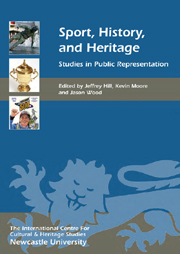Book contents
- Frontmatter
- Contents
- List of Illustrations
- Acknowledgments
- Sport, History and Heritage: An Investigation into the Public Representation of Sport – Editors' General Introduction
- HISTORY, HERITAGE AND SPORT
- MUSEUMS AND THE REPRESENTATION OF SPORT
- SURVIVALS AND LEGACIES: SPORT, HERITAGE AND IDENTITY
- 12 Survivals and Legacies: Sport, Heritage and Identity
- 13 Anfield: Relocating Liverpool's Spiritual Home
- 14 The Canonisation of Common People: Memorialisation and Commemoration in Football
- 15 Heritage, Culture and Identity: The Case of Gaelic Games
- 16 Olympic Heritage – An International Legacy: The Invention of the Modern Olympic Stadium from Coubertin to 1948
- 17 The Indianapolis 500: Making the Pilgrimage to the ‘Yard of Bricks’
- Afterword: History and Heritage in Sport
- List of Contributors
- Index
- HERITAGE MATTERS
12 - Survivals and Legacies: Sport, Heritage and Identity
from SURVIVALS AND LEGACIES: SPORT, HERITAGE AND IDENTITY
Published online by Cambridge University Press: 05 April 2013
- Frontmatter
- Contents
- List of Illustrations
- Acknowledgments
- Sport, History and Heritage: An Investigation into the Public Representation of Sport – Editors' General Introduction
- HISTORY, HERITAGE AND SPORT
- MUSEUMS AND THE REPRESENTATION OF SPORT
- SURVIVALS AND LEGACIES: SPORT, HERITAGE AND IDENTITY
- 12 Survivals and Legacies: Sport, Heritage and Identity
- 13 Anfield: Relocating Liverpool's Spiritual Home
- 14 The Canonisation of Common People: Memorialisation and Commemoration in Football
- 15 Heritage, Culture and Identity: The Case of Gaelic Games
- 16 Olympic Heritage – An International Legacy: The Invention of the Modern Olympic Stadium from Coubertin to 1948
- 17 The Indianapolis 500: Making the Pilgrimage to the ‘Yard of Bricks’
- Afterword: History and Heritage in Sport
- List of Contributors
- Index
- HERITAGE MATTERS
Summary
In my first year at secondary school I won an essay competition. The title was intriguing and, as it turned out, prophetic. It read: ‘Imagine you are an archaeologist in the year 3000. Describe and interpret your discoveries resulting from the excavation of Anfield Football Ground in Liverpool.’
It is at times like this when you wish your parents had kept all your school work. I do, however, dimly recall that the Anfield excavation revealed an enclosure of concrete terraces and turnstiles. The conclusion reached was that the building was an open-air prison (the turnstiles only permitting entry one way) and, to judge from the graffiti, the inmates had taken to worshipping a God named Shankly.
Fast forward 40 years to June 2010, and a meeting to explore the heritage implications of the decision to redevelop the site of Anfield when Liverpool's proposed new stadium across the road in Stanley Park is completed (Wood 2010). I am sitting in 5-star luxury in one of the executive boxes in the Centenary Stand, staring incredulously at a wall poster on which some corporate sponsor has contrived to misspell the name Shankly. A quote from another famous manager, Brian Clough, springs to mind:
A lot of people are coming to games who wouldn't know Stanley Matthews from Bernard Matthews. The stands are full of people who can't tell you anything about the game unless it happened after 1990. They're either so conceited or so stupid that they believe football was invented just five minutes before they became interested in it.
(Hamilton 2007, 197)- Type
- Chapter
- Information
- Sport, History, and HeritageStudies in Public Representation, pp. 183 - 194Publisher: Boydell & BrewerPrint publication year: 2012



